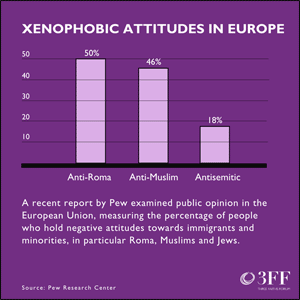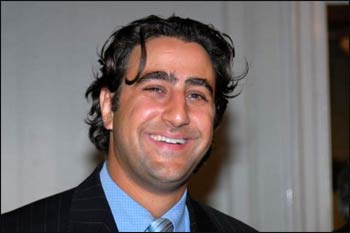By Paul Chaffee
MAKING INTERFAITH DIALOGUE WORK, SMALL-SCALE TO LARGE-SCALE

The pleasing, frustrating truth about interfaith organizations is that most are one-of-a-kind, as unique as a finger-print, each with its gifts and limitations and its own particular culture. We share high values like respect, peacemaking, and justice; all of us promote ‘interfaith dialogue’ in myriad ways. But most of our groups are not connected to each other or even networked. Most are rigorously self-defining, often aimed at a particular cause or community, not the world at large. Most interfaith groups get little attention from the general public or the media and offer programs to the same group, over and over. And most of us have had difficulty when donors ask for measurable outcomes, for ‘metrics’ that make the case that their money in your program is well spent.
So discovering Three Faiths Forum (3FF), headquartered in London, is disconcerting. A series of surprises. An astonishing revelation of what one nonprofit (called a “charity” in England) has accomplished since its founding 17 years ago.
For starters, 3FF seems to break so many rules. The given wisdom today is to focus on your particular mission, your specific audience and constituency. 3FF works with school children, university students, young professionals and artists, members of Parliament, and the general public. And if you have a group, they’ll bring the program to you.
In all, the goal is “to build understanding between people of different faiths and beliefs.” Thousands of us share this mission; 3FF is actually getting it done across the United Kingdom and now is venturing into the rest of Europe, the U.S., and, most actively, the Middle East.
A Platform for Mastering Interfaith Dialogue
In 1997 there was a felt need in British society for a ‘safe place’ where Christians, Jews, and Muslims could talk freely, securely, about themselves and their concerns. In response, Sir Sigmund Sternberg, a Jewish philanthropist and interfaith activist, Sheikh Dr. Zaki Badawi, a distinguished Islamic scholar, and interfaith historian Rev. Dr. Marcus Braybrooke, whose articles as a TIO Correspondent grace these pages each month, co-founded the Three Faiths Forum. It was designed as a place where leaders could meet; but also as a context for working with people “at all levels of society… to learn, engage and build new relationships across community lines.” Along the way, 3FF grew from engaging Abrahamic communities to welcoming and engaging people from all faiths and belief systems.
Their Schools Program developed ten years ago, based on the conviction that “young people should feel confident communicating and collaborating with anybody,” regardless of any differences. In 2013, 11,000 students and a thousand teachers, educators, and leaders went through 3FF training programs, with these goals:
- Learn how different people understand and live their faiths and beliefs
- Dispel common myths and stereotypes
- Understand the diversity within and between different traditions
- Become more able to ask and answer questions in a sensitive way
- Learn to understand and share their own faiths and beliefs
2013-14 University ParliaMentors – Photo: Facebook
Three years later, in 2007, Undergraduate ParliaMentors was launched, a leadership development program. It gives students access “to leadership and facilitation training, mentoring opportunities, and new professional and social networks.” Each year a new class of ParliaMentors focus on politics in action, creating social change, developing leadership skills, and building lifelong networks.
After a year in the program, ParliaMentors are invited into an Alumni Network. The project won the 2010 U.N. Award for Intercultural Innovation, particularly for itsmentoring activities. A year earlier, 3FF received its first U.N. Award for Intercultural Innovation for its educational tools.
Moving up the life cycle, Urban Dialogues and Women ARTogether were launched in 2009 and 2010, both of them using the arts – music, drama, curated exhibitions, and more – inviting the young professionals who attend to enter into extended conversations about the art and its themes.
At the heart of everything 3FF does is ‘intercultural understanding’ training. It seeks out opportunities to engage leaders from all sorts of arenas for one or two-day trainings focused on five goals: establishing ‘safe spaces’ for intercultural meetings, learning the power of empathetic language, facilitation in leading discussions, creating welcoming environments, and promoting the value of intercultural interaction.
A number of training resources are available to download, including an “interfaith 101 kit” and a plan for linking schools from different faith traditions based on their own experience of linking institutions. Last March, at the “11th Doha International Conference for Interfaith Dialogue” in Qatar, focused on education, 3FF received the Doha International Award for Interfaith Dialogue.
Going International in Jerusalem
Along the way 3FF has become active beyond the UK, including partnering with United Religions Initiative in its Talk Back to Hate campaign. They have begun offering trainings in New York City. Their major overseas activity is in Jerusalem, in partnership with the Cambridge University’s Inter-Faith Programme and the New York-based Tanenbaum Center for Interreligious Understanding. Cambridge has developed ‘scriptural reasoning’ workshops for Christians, Jews, and Muslims gathered for discussion of scripture from their respective traditions. To this curriculum, 3FF brings its extensive intercultural training experience. Together they are working with doctors and nurses at five hospitals in Jerusalem. Three of the hospitals have made the training mandatory, and the Israeli Ministry of Health has mandated that “cultural competency” must be taught to all healthcare professionals.
3FF has also begun projects in Jerusalem with university students and with existing interfaith organizations interested in new models of leadership training and relationship building.
The Team that Puts it All Together
Stephen Shashoua, 3FF Director – Photo: ROI Community
Many dynamic interfaith organizations have a leader or two, sparkplugs, who provide the inspiration and people-skills to move everything forward. At 3FF today that is clearly director Stephen Shashoua. Born in Canada with an Iraqi Jewish heritage, he has been with the organization for ten years, serving as its director since 2008. But part of the genius here is that the organization is able to maintain a team of 16 professionals – the staff-page on their website, full of biographical detail and photos, begins to convey how 3FF manages the huge collection of programs it produces.
3FF is supported by donations, patrons, significant foundation support, and the City of London. With their single-minded attention to multicultural training skills, their various efforts with different age groups have resulted in a growing web of relationships rather than competing programs. And the organization is clearly making donors happy with their measurable results in creating multi-faith harmony and engagement.
Once again, it must be emphasized that every interfaith organization has its own idiosyncrasies, gifts, and concerns, and using 3FF as a model to duplicate might be impossible. That said, this organization has much to teach interfaith activists and organizers everywhere. In particular, note their rare ability to engage communities that are new to interfaith. Also, exploring their extensive website and its embedded videos suggests that hospitality, discovery, joy, and a good time seem to attend everything they do. In short, interfaith students and leaders would do well to approach 3FF as a case study in interreligious programming and creating a healthy interfaith culture for our children and ourselves.



